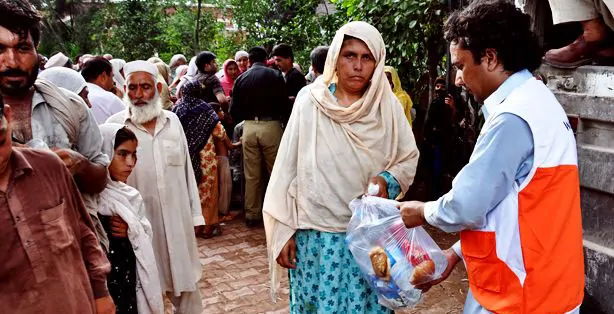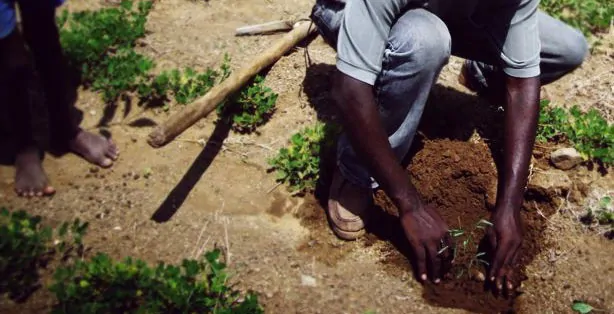
When floods washed away Chakdara Bridge—Lower Dir’s main connection with the rest of Pakistan—it cut a vital link to health services for people in the region at a time when they were more important than ever.
The Lower Dir District is one of the most heavily affected regions of Khyber Pakhtoonkhwa Province (KPK), where a state of emergency has been declared as monsoon rains and flash floods continue to devastate the area. In addition to killing more than 1,400 people and affecting more than 4 million people across the country, the floods have left the region covered in mud and standing water—potent breeding grounds for cholera, diarrhea and other water-borne diseases.
“The threat of water-borne diseases is increasing as the water recedes in the flood-affected areas,” says Dr. Rasheed Ahmad, World Vision’s Area Manager for Lower Dir. “We are already receiving patients with diarrhea, upper respiratory tract infections and skin infections in the health clinics. We fear that we will be seeing even more diarrhea and other stomach illnesses in the future.”
The Chakdara Bridge was not only the fastest, but also the most secure way for the people of Chakdara to get to Temergarah; the nearest town in which they could get medical care. When the bridge was washed out, people had to resort to crossing by boat or traveling one at a time on a makeshift rope bridge. Hundreds of people queue on both sides of the river for most of the day, waiting for the chance to get across. On the Chakdara side, many of those waiting need to get to medical care.
On Aug. 6, World Vision opened a free medical clinic in Chakdara, staffed by a doctor, a Lady Health Visitor and support person. With medicine provided by the World Health Organization, this team was immediately able to begin providing emergency medical treatment to patients near their homes without them having to make a risky river crossing or a longer, sometimes dangerous land route. It is also the only clinic in the area to offer a Lady Health Visitor.
“People are very happy and relieved with the opening of the medical clinic in our area,” said Ahmad Jan, 11, one of the early patients at the clinic. “They have a female doctor as well and they treated us well and gave us free medicines. We don’t have to go too far now.”
The clinic was the third of three clinics World Vision opened in the area, including one serving the Khazana Bypass area established in cooperation with the Executive District Officer of Health and World Health Organization, and one in Kandaro created in cooperation with the Ministry of Health. The clinics were planned as part of World Vision’s long-term program for Internally Displaced Persons, but have also been able to meet the pressing health needs created by the floods.
Lower Dir is a conflict-affected area where even prior to the floods, existing health clinics were damaged, medical supplies had been looted and health staff forced to leave. Crowded conditions, overstretched caregivers, poor sanitation, lack of clean water and inadequate nutrition contribute to high levels of mortality in young children.
One of the many families affected by the flood includes Nasreen, her husband Riaz and their three children. Just a couple of weeks ago, they lived in a mud house near the river in Mohib Banda, a village in the tehsil (large town) of Pabbi, in Nowshera district of Khyber Pakhtoonkhwa Province (formerly called North West Frontier Province). Riaz worked as a laborer, and the family owned two cows.
Then monsoon rains of epic proportions started to fall and the river began flooding. At 6 a.m. one morning as the water rose toward the roof of their home, Nasreen and her family decided to make a dash for the tallest building in their neighborhood: the local mosque and school.
For three days they crammed together on the rooftop of the school with more than 100 people from houses close to the river, exposed to the elements and waiting to be rescued, or at least for something to eat. After three days on the roof, a Pakistani military helicopter dropped food supplies. Later that day, a helicopter began airlifting people to higher ground, out of the reach of the swirling torrent of mud and water.
Though safer, the conditions at the camp where they have taken refuge are hardly ideal. Nasreen and her children share a classroom at the Pabbi Government High School with about 50 people. Severe overcrowding contributes to the stifling, suffocating heat and stench in each of its rooms.
World Vision recently began giving out food parcels containing milk, bread, snacks, biscuits and water to 1,000 families at that school and others nearby—including Nasreen and her family. The parcels are benefiting around 7,000 people.
“We have been living on the charity of the locals and the surrounding villages for now,” said Nasreen. “You are the first people who have approached us, and you’ve given us the food and water with dignity.”
The water has receded from Mohib Banda now, but the mud and debris strewn across the land is like quicksand. Many of the homes—also constructed out of mud—have been washed away. For those families, like Nasreen’s, it won’t be a matter of cleaning up, but of rebuilding. They haven’t yet figured out how to replace the cows and recover their livelihood.
“I don’t know what we will do now,” said Nasreen. “We were poor already and lost whatever we had in the floods; our only shelter and means of income. Where do we go from here? We have nowhere to go.”
Muhammad Ali is the senior communications officer for World Vision Pakistan. Over the next three months, World Vision has immediate plans to help in four of the worst-affected districts; Peshawar, Charsadda, Nowshera and Lower Dir in KPK. World Vision continues to work closely and in partnership with the United Nations and other non-governmental organizations through the Pakistan Humanitarian Forum to ensure that effective, efficient and timely assistance is given to the children, women and men affected by the floods.





















